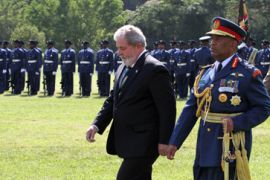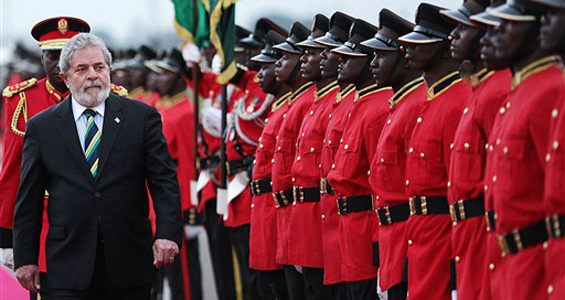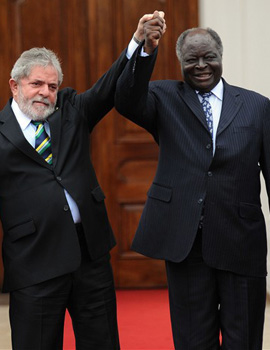Lula: Secretary General of Africa
The Brazilian president is on his ninth trip to the African continent in eight years.

 |
| Brazil’s president is on his ninth trip to Africa in his eight years as president [AFP] |
Luiz Inacio Lula da Silva, Brazil’s president, might as well have a sign on his office door that reads: “Secretary General of Africa.”
This week Lula is on this ninth trip to the African continent in the past eight years as president.
He has made official visits to 25 of the 53 African countries; an astonishing feat by a head of state by anyone’s calculations.
This week Lula is in the middle of a trip that will take him through six African countries.
On Saturday he was in Cape Verde, on Monday in Equatorial Guinea, on Tuesday in Kenya and Tanzania, today and tomorrow he is in Zambia and then he finishes with several days in South Africa.
With the World Cup taking place in South Africa, many heads of state have found it a convenient time to visit the continent – and to take in a match or two.
But for Lula, whose eight year run as president of Brazil comes to an end in December, his journey back to the continent is not some perfunctory state visit that is meant to be a photo opportunity in a Jeep on a safari. In fact, it is just the opposite.
Lula has invested himself and Brazil’s overall foreign policy heavily in Africa, maybe more so than any other non-African leader in modern history.
There are deep and well publicised ties between many parts of Brazil and the African continent, from food to music and culture. It can be traced back to when the Portuguese sent millions of African slaves to Brazil during the colonial era.
Today, more than half of Brazil’s 190 million people trace their ancestry back to Africa, and it is often said that Brazil’s black population is larger than anywhere else in the world except Nigeria. Add to this is the fact that several African countries share the Portuguese language (Mozambique and Angola, to name a few) and there are natural reasons for Brazil to increase its ties to the continent.
Controversy
But Lula’s trip has not come without some controversy from naysayers at home and abroad, with his visit to Equatorial Guinea raising eyebrows in the Brazilian media.
The tiny West African country is governed by President Teodoro Obiang Nguenma Mbasogo, who rose to power 31 years ago in a military coup.
But Mbasogo’s government has been heavily criticised by groups such as Human Rights Watch for suppressing basic human liberties and western onlookers have called recent elections there neither free nor fair.
Despite being the third biggest petroleum producer in sub-Saharan Africa, the country last year ranked 118 out of 182 countries on the UN human development index. And NGOs who follow the country say there is speculation the oil revenue is being siphoned off by the ruling elite.
Celso Amorim, Brazil’s foreign minister, brushed aside criticism of Lula’s visit to “a dictator,” as some in the Brazilian press have referred to it, telling reporters: “We are not helping or promoting a dictator. Who resolves the problems of each country, is the people of each country.”
‘Business is business’
 |
| Luiz Inacio Lula da Silva, left, with Mwai Kibaki, Kenya’s president, in Nairobi [AFP] |
Amorim also said “business in business,” in reference to the motivating factors for the trip being economic and not to meddle in the internal politics of the country.
But Equatorial Guinea accounts for less than 0.01 per cent of Brazil’s total trade, so Lula’s stop-off there is likely to be part of a much larger pan-regional economic and diplomatic African strategy that has been in an implementation phase for many years.
Brazilian companies are always looking for new markets to do business, and see opportunities in Equatorial Guinea.
But an editorial in today’s O Estado de S. Paulo newspaper mocks Lula’s visit to the country, with a headline blaring: “Good business for a dictator.”
But Brazil is in a race to keep up with her main competitors in economic integration with Africa.
Brazil now measures its own economic performance against that of the three other BRIC countries – Russia, India and China.
While Brazilian trade with other BRIC countries grew from $9.8bn in 2003 to $49bn in 2008 (a 500 per cent increase), Brazil is lagging slightly behind when it comes to economic integration with the African continent.
Africa only accounts for 11 per cent of Brazil’s total imports, as compared to 20 per cent for India and 64 per cent for China. Only 20 per cent of Brazil’s exports are destined for Africa, the same percentage as India but way behind China at 58 per cent, according to the IMF.
And according to FDI Intelligence, between 2003 and 2009 Brazil only had 25 major investment projects in Africa worth $10bn, lagging behind Russia, which had 47 projects worth $9.3bn, India, with 130 projects worth $25bn, and China, 86 projects worth $28.7bn.
From a diplomatic standpoint, Brazil has the fewest embassies in Africa with 28, compared to India’s 37, Russia’s 30, and China’s 47.
Broader aspirations
As the clock ticks down on Lula’s term as president, it is becoming increasingly clear that he wants to play a large role on the international stage and his frequent trips to Africa as president will probably help shape his post-presidency life.
He recently acknowledged this, saying that he will be looking for opportunities to work against poverty and hunger, particularly in Latin America and Africa.
There has been speculation that Lula’s dream job is that of secretary general of the United Nations, but while in Cape Verde over the weekend Lula threw cold water on that rumour, saying: “The secretary general job is that of a technician, a bureaucrat. The job is not for a politician. A politician can create very serious problems [as secretary general].”
There has been some talk about Lula being a perfect fit to lead the UN’s Food and Agricultural Organization (FAO), or to take on a special envoy role with Africa. He most certainly will start a foundation, possibly run by Amorim, his foreign minister.
But, whatever the future might hold for Lula after his presidency expires, it is a good bet it will involve work directly with the African continent – after all, he has an authentic knowledge of the continent like few other non-African leaders.